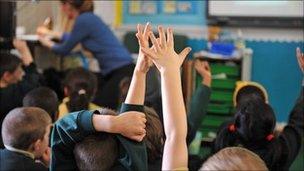Can Welsh schools learn lessons from Finland?
- Published

Schools in Finland stopped having inspections as "they weren't helpful"
The school system in Wales is bracing itself for major reforms, after a series of reports concluded the system was failing.
The catalyst for the concerns was the publication of the PISA tests in December, which showed Welsh children were behind much of the world in reading, maths and science.
Finland, by contrast, is PISA's (Programme for International Student Assessment) best ever performing country.
BBC Wales went to Helsinki to see what lessons Wales could learn, as education correspondent Ciaran Jenkins reports.
It's a language class like I've never seen before.
The teacher, Tuulia Stenberg, is reading. Meanwhile, her eight-year-old pupils at Pelimannin Primary School are rolling around on the floor.
There isn't a behaviour issue here; the children are simply being encouraged to interpret the story in their own way.
"It's very tiring for them to sit behind desks," says Ms Stenberg.
"It is better for them to be active".
If all classes in Finland are this exhausting, it's no wonder there are fewer teaching hours here than the rest of Europe.
'Education miracle'
But then, when journalists and politicians come to Finland to enquire about their "education miracle", they probably don't expect to be told the secret is to teach children less and let them run around the classroom.
There are more surprises when Finland's education state secretary, Tapio Kosunen, tells me they did away with school inspections because "they weren't helpful".
The country's 15-year-olds may consistently perform among the best in the world in the PISA international tests, but I'm beginning to wonder how.
The answer, according to Reijo Laukkanen, who's been a member of the country's board of education for over 30 years, is that Finland trusts its teachers.
It is certainly a highly qualified profession - students study masters level courses for at least two years.
Leena Krokfors, professor of teacher education at Helsinki University, tells me it's one of the two most sought after graduate occupations.
It means she's able to choose only the very best candidates, and after a rigorous selection process, 90% miss out.
In Wales, there are plans to double the length of teacher training courses.
But it would take some time before teachers could be described as "the most qualified in the world", as Prof Krokfors likes to refer to the workforce she has trained.
Crowd control

BBC Wales education correspondent Ciaran Jenkins is visiting schools in Finland's capital, Helskinki
The quality of the teacher in front of the class is irrelevant, however, unless the pupils are prepared to listen.
Too often, teachers at home tell me their job is a cross between crowd control and social worker.
Well, in Pelimannin School for children aged seven to 12, they employ a genuine social worker, and a nurse and psychologist too.
The theory is that every child is capable of the same educational outcomes, regardless of problems at home.
And it works - in Finland there is less variation between the most and least able students than anywhere else in the world.
It's clear there are plenty of lessons to be learned from Finland's education success, but they're unlikely to appeal to politicians interested in a quick fix.
As Reijo Laukkanen from the board of education says, you can't expect a nation to suddenly trust its teachers overnight.
"If the results improve, though, then perhaps the trust will come."
- Published7 December 2010
- Published7 December 2010